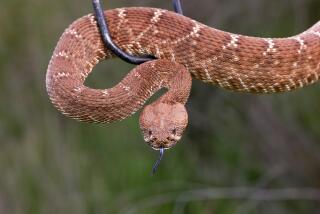Predatory Snakehead Fish Is Vanquished, Officials Say
- Share via
WASHINGTON — The state of Maryland has declared victory in its war on snakeheads, the aquatic invaders whose bristling teeth and ability to migrate by land made them the real-life equivalent of summer horror-movie creatures.
After a final round of tests this month at a rural Maryland pond found no trace of the fish, Maryland wildlife officials said they plan to ask the Legislature next year to tighten standards and scrutiny of snakeheads and other predators.
“We’re pretty confident they’re eradicated,” said Eric Schwab, director of Maryland’s Department of Natural Resources Fisheries Service. Schwab said wildlife officials expect to “be in direct discussions with the state Legislature about providing more control over the movement of nonnative species in and around the state.”
Sporting teeth as sharp as dog fangs and able to flop across dry land, the Asian-origin northern snakeheads stunned officials in May not only by their startling emergence in a pond near the town of Crofton, but also by their rapid procreation. Two years after two adult snakeheads were apparently dumped into the pond, more than 100 of the bulky fish were hauled out by state officials during the summer.
The state’s quick action to combat the snakeheads before they spread to other waterways impressed scientists who have long urged a faster response against wildlife invaders.
“It’s a textbook case of what we should be doing,” said David Lodge, a University of Notre Dame ecologist who is on a federal panel planning strategies to stem the flow of foreign wildlife and aquatic interlopers. “By the time we hear about most of these cases, it’s usually too late to do anything more than keep their numbers under control.”
Infamous for their appetite for other fish populations, more than 17,000 of the scaly snakeheads have been imported into the U.S. in recent years -- some as pets, others as prized meals in Asian restaurants.
By July, media accounts about the daunting-looking snakeheads found in Maryland had captured national attention and spurred official action. Interior Secretary Gale A. Norton announced plans to place snakeheads on a federal watch list as a “most-wanted” predator. In Maryland, state biologists dumped herbicides and fish poison into the Crofton pond to kill plant life and choke the snakeheads before they multiplied.
Schwab said state wildlife officials are now so certain of their victory over the snakeheads that they do not plan further eradication measures next year. “We’re not planning any more direct samplings,” Schwab said. “We don’t think there are any snakeheads left, but if there are, they’ll show up in our routine samplings.”
Officials hope to persuade political leaders to back recommendations made by an advisory panel last summer to give the state more flexibility in fighting wildlife invaders.
Most of the recommendations will be politically acceptable, said Donald F. Boesch, who heads Maryland’s Snakehead Scientific Advisory Panel. Boesch, an estuary sciences expert at the University of Maryland, said the state needs to toughen its legal line of defense against aquatic predators.
Maryland law bans importing or introducing non-indigenous fish species into state waterways, Boesch said, but a loophole fails to cover those who spread the invaders by accident or negligence.
“State agencies and the [Department of Natural Resources] need a more solid basis to act when they have to,” Boesch said.
But state officials are less certain about whether they will be able to persuade Maryland’s new governor, Robert L. Ehrlich, to back another of the panel’s recommendations.
The panel urged that Maryland’s Department of Natural Resources be granted more authority “to take steps to eradicate or control the spread of prohibited species even when the fish are in tanks or ponds on private property.” They acknowledged that those steps might require court orders.
“When there is a clear danger, we felt it was appropriate for the state to go in and do what’s necessary,” Boesch said.
But officials said they are unsure whether that recommendation will be supported by Ehrlich, a Republican congressman who sometimes sided with property-rights interests in House votes.
The new governor “will want to strike a careful balance between property-rights needs and any proposal that takes an active position on public health rights,” said Henry Fawell, Ehrlich’s spokesman. But Fawell cautioned that any move would not “come at the expense of property rights.”
Boesch and state wildlife officials hope a compromise can be found by offering property owners compensation for damage incurred when the state moves against wildlife invaders.
That is already the case with the Crofton pond invaded by the snakehead, Schwab said. Once poison levels fade in the privately owned pond, officials plan to restock it with catfish, pickerel and large-mouthed bass -- the fish that swam there before they were joined by lurking snakeheads.
More to Read
Sign up for Essential California
The most important California stories and recommendations in your inbox every morning.
You may occasionally receive promotional content from the Los Angeles Times.













